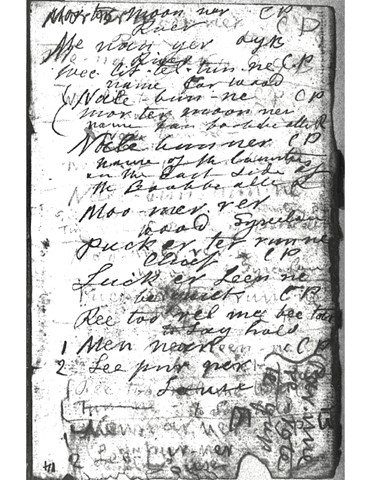TASMANIA Words: 'blossom', 'white', 'juice', 'sap', 'blood'
- Jeremy Steele

- Aug 23, 2025
- 6 min read
Updated: Jan 29
It is not only Your Amateur Researcher (YAR) who finds trying to make sense of the Tasmanian records difficult. Terry Crowley and R.M.W. Dixon wrote in their chapter "Tasmanian" in Handbook of Australian Languages, edited by R.M.W. Dixon and Barry Blake, J., 1981, as follows:
on p.420: “The material on Tasmanian is so poor that almost nothing can be inferred with any degree of confidence.”
on p.400: “The materials on Tasmanian dialects range from poor to almost non-existent; we have two or three hundred words from some of the south-eastern groups but only a dozen or so words from some groups in the western regions. There is almost no grammatical information—at best two pronominal forms.”
and on p.395 at the very beginning of the 26-page article: “The source material on the now extinct Tasmanian languages is so poor that only very limited conclusions can be drawn concerning the structure of the languages.”
Only a few people made original records. Of the couple of dozen vocabulary lists, numerous are re-workings of previous lists. Everything began as handwritten vocabularies, and handwriting, while often fairly good, can be done at times with little care—or thought of someone trying to make sense of it two centuries later.
YAR's attempt at transcribing a challenging page in the G.A. Robinson records
As well, those making the lists often did not seem to have grasped the real meaning of what they heard and thought they understood at the time. Another factor making things hard for a researcher in the twenty-first century is that the lists covered all parts of Tasmania, and scholars have estimated there might have been as many as a dozen different languages on the island. Often the recorders noted in which part of Tasmania a record was made, which gives a clue as to the language concerned, although the picture was muddied when the remnant Aboriginal population was rounded up in the 1830s and placed together in the settlement of Wybalina on Flinders Island in the Bass Strait. Vocabularies obtained there could have been from different individuals from anywhere in Tasmania.
YAR had occasion to look at Plomley’s analysis of the Tasmanian records, p.229:
PLOMLEY, N. J. B. A Word-List of the Tasmanian Aboriginal Languages. Launceston: N.J.B. Plomley in association with the Government of Tasmania., 1976.
This led to looking up some of the words mentioned in the extract, and in Plomley’s notes at the bottom.
maleetya: blossom – or white?
Australian | respelt | English | EngJSM | source |
"malleetyé" | mali-dyi | "white" | white | Plomley mj [A610.mj:468:25] [OyB] [Tas] [1857] |
The search was actually for malidya, supposedly ‘white’, yielding about fifty results, the first of which being those shown in Fig. 2:
1 | puggya malleetya | woman, adult |
2 | panogana malletya | dirt (mud of a whitish colour) |
3 | Panogana maleetya | Dirt (mud of a whitish colour) |
4 | pannogana malittyé | clay |
5 | Pannogana malittyé | Clay |
6 | potha malleetyé | freestone |
7 | tuggara maleetyé | juice of a plant, white |
8 | Tuggara maleetye | Juice of a plant (white) |
9 | [kotto‑malletye] | Girl |
10 | kottomalletye | girl |
11 | Lowa maleetya | The woman is very fair |
12 | Lowa maleetya | The woman is very fair. |
13 | [Lowa maleetya.] | [The woman is very fair.] |
14 | [panogana malletya] | [dirt (mud of a whitish colour)] |
15 | [miangamalleetya] | [sap] |
16 | mal.lit.yer | [white] |
Fig. 2 Selection of maleetya records
A search result such as this is always of interest. For example the 11th and 12th items, Luwa maleetya, with luwa being one of numerous words for ‘woman’, could be seen to be ‘woman white’, or white woman.
But it was the 7th and 8th entries—tuggara maleetyé— that caught YAR’s eye next, ‘juice of a plant, white’. maleetyé was obviously ‘white’, so could tuggara be ‘juice’?
tuggara: juice?
Let us have a look at tagara words.
1 | tagara | go away |
2 | taggara | absent |
3 | [tag.er.er.mot.tye.ger] | [walk abreast] |
4 | tagara | {walk} |
5 | tagara | Go away |
6 | Taggara | Absent |
7 | tagara toomiack | cry (weep) |
8 | [tagara toomiack] | Cry (weep) |
9 | [tagara toomiack] | Cry (weep) |
10 | tuggara maleetyé | juice of a plant, white |
11 | Tuggara maleetye | Juice of a plant (white) |
12 | taga-ramena | Weep |
13 | tag.er.er.mot.tye.ger | walk abreast |
14 | tuggara nowe | dine (to) |
Fig. 3 Selection of tagara records
Some fifty records again resulted from a dagara search, a group from around the middle of the result being shown in Fig. 3. tagara, and words like it, respelt as dagara, often signify movement, or ‘go’, as the first half dozen shown indicate.
At items 10 and 11 in Fig. 3 there are the same entries for ‘juice of a plant, white’ seen before, but nothing else specifically for ‘juice’. As ‘juice’ is something of a specialised word, what about considering something else that is liquid, such as, say, ‘weep’ in the middle of the list?
This led to a search for ‘weep’, for which there were so many responses in the database that a second search was narrowed to words in the orange ‘respelt’ column beginning with ‘d’. And there being still so many of them remaining that some of them were specifically selected, with the result shown in the table:
"[ter.tar.rer.toi.yer.nem.ber.rer]" | dada-ra | "[cry]" | weep | Plomley cr [:194:24.1] [BRiv] [Tas] [c.1838] |
"tar.dick.kar" | dadi-ga | "cry" | weep | Plomley gar [:194:7] [Wst] [Tas] [c.1835] |
"targa" | daga | "cry" | weep | Plomley bm [A614jjBr:194:10],[NW],[Tas],[1846] |
"targa" | daga | "cry" | weep | Plomley jj [A614jjBr:194:11],[NMid],[Tas],[c.1835] |
"Ta-gar-a-ga" | daga-ra-ga | "Crying." | weep | Beattie, J.W. including HWM 1824 [:80:45] [OyB] [] [1824] |
"tara" | dara | "Weep (to)" | weep | Roth: vocabs [:19:13.1] [] [Tas] [1802] |
"Tara" | dara | "Cry." | weep | Péron, François 1824 [:129:24] [SE] [] [1802] |
"ty.rer" | dara | "cry" | weep | Plomley st [:194:21] [SE] [Tas] [1828] |
"tarragatté" | dara-gadi | "tear" | tear-drop plenty | Plomley mj [A610.mj:194:22] [SE] [Tas] [1857] |
"taarana" | dAra-na | "crying" | weep | Plomley rb [:194:16],[SE],[Tas],[1828] |
"tērrăr" | dira | "Cry, to" | weep | Roth: Norman, Rev. James Port Sorrell [:2:14] [Nth] [Tas] [1832-67] |
"tẽrrăr" | dira | "cry" | weep | Plomley sn [:194:15],[],[Tas],[1828?] |
From this it can be seen that there appear to be four main words for ‘weep’: dada, daga, dara and dira. Of these, one record draws the attention— the fourth last, tarragatté, respelt dara-gadi, and translated in the light-grey column as ‘tear’.
"tarragatté" | dara-gadi | "tear" | tear-drop plenty | Plomley mj [A610.mj:194:22] [SE] [Tas] [1857] |
In the yellow column a suggestion as to the real meaning of dara-gadi is given: ‘tear-drop plenty’. Is this reasonable? First, it can be noted that tears are the result of weeping, and second, a search could be—and was—made for gadi, with the following results:
"car.te.yer" | gadi-ya | "bad" | bad | Plomley gar [:136:14] [NMid] [Tas] [c.1835] |
"pude.yer.car.te.yer" | budya gadiya | "no good" | bad [no bad ?] | Plomley gar [:136:22] [NMid] [Tas] [c.1835] |
"cardia" | gadi-ya | "plenty" | plenty | Plomley jj [A614jjBr:357:11],[],[Tas],[c.1835] |
"car-di-a" | gadi-ya | "For a higher number than two the native Blacks always say Car-di-a." | plenty | Plomley bm [A614jjBr:357:12] [SW] [Tas] [1846] |
"kar.te.yer (x)" | gadi-ya | "plenty" | plenty | Plomley gar [:357:22] [NE] [Tas] [c.1835] |
"Cardia" | gadi-ya | "Plenty" | plenty | Jorgenson in Braim [A614:73.1:3] [T-S] [Tas] [c.1835] |
There were numerous results for this search for gadi (although the results included a suffix -ya of unknown significance), giving the possibility of two basic meanings: ‘bad’ (or good) and ‘plenty’.
At the outset it was explained that the quality of the Tasmanian records leaves much to be desired, and on this basis—assuming the bad/good meanings to be perhaps unreliable—it might be reasonable to assume that the real meaning of gadi could be ‘plenty’, and so ‘tear-drop plenty’ could be the result of much sobbing.
mianga: sap, juice, blood?
Now for something else. In the second figure above, ‘Fig. 2 Selection of maleetya records’, note the second-last entry, miangamalleetya: sap.
This long word is probably two words, one being malleetya (‘white’), and the other mianga, collectively being given as meaning ‘sap’, the exudation from trees. It is worth noting here that European languages, and certainly English, have big vocabularies including special words describing small details. In certain areas, where European languages have a paucity, Aboriginal language have this feature too, as in words for human relationships. And while English has, in addition to ‘sap’, words such as exudation, ooze, goo, fluid, liquid, Aboriginal people might use just a single word for sap oozing from a damaged tree and for the ooze resulting when a human body is injured in some way, i.e. the word ‘blood’. So a search for ‘blood’ (including ‘sap’ and ‘juice’) was made in the Tasmanian database, for words beginning with ‘m’ (as in mianga).
mang.er.ter.min.ner | blood |
mȳã gŭrmẽenĕr | blood |
miangatentya | sap |
miangamalleetya | sap |
miengaleena | juice of a plant, red |
tuggara maleetyé | juice of a plant, white |
{miangmalleetya} [sic] | Sap |
Fig. 4 Selection of records for ‘blood’, ‘juice’, ‘sap’
"tuggara maleetyé" | dagara malidyi | "juice of a plant, white" | teardrop white | Plomley mj [A610.mj:378:6] [OyB] [Tas] [1857] |
"mang.er.ter.min.ner" | manga-da-mina | "blood" | blood | Plomley cr [:167:17] [BRiv] [Tas] [c.1838] |
"mȳã gŭrmẽenĕr" | mayagur-mina | "blood" | blood | Plomley sn [:167:19],[],[Tas],[1828?] |
"miengaleena" | minga lina | "juice of a plant, red" | juice [blood water] | Plomley mj [A610.mj:377:41] [SE] [Tas] [1857] |
"miangatentya" | miyanga dindya | "sap" | blood red | Plomley mj [A610.mj:377:38] [OyB] [Tas] [1857] |
"miangatentyé" | miyanga dindyi | "juice of a plant, red" | blood red | Plomley mj [A610.mj:377:39] [OyB] [Tas] [1857] |
"miangamalleetya" | miyanga malidya | "sap" | blood white | Plomley mj [A610.mj:377:40] [OyB] [Tas] [1857] |
"{miangmalleetya} [sic]" | miyang malidya | "Sap" | sap | Curr 3,#A12a, Milligan,Oyster,Bay,[3:660:1.12] [OyB] [Tas] [1859] |
As Fig. 4 and the table below it show, there are a number of blood/sap/juice words beginning with ‘m’. manga, minga, miyang(a) and even mayagur, when spoken aloud, all sound much the same and so probably represent the same basic word, confirming the thought that Tasmanians might well have used the same words for ‘sap’, ‘juice’ and ‘blood’.
Conclusion
While the Tasmanian records are something of a mess they can at times be the source of insights into how this mysterious section of the Australian language family actually worked.
Jeremy Steele
19 August 2025











Comments